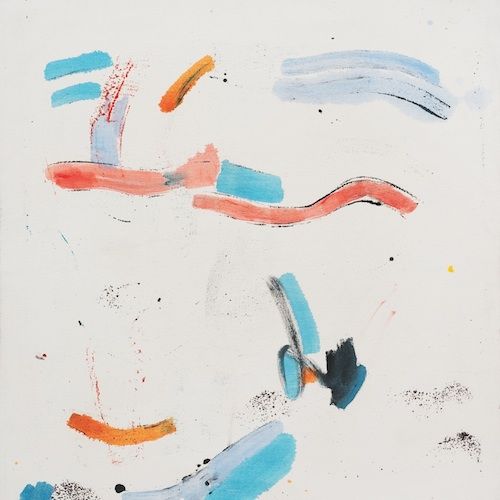A master of romantic abstraction, Jefre Cantu–Ledesma is not new to the scene. In fact, he's been releasing a steady stream of music for nearly twenty years. With the brilliant album A Year With 13 Moons, however, the ever–prolific Ledesma appears to be hitting a new high. Or low, depending on how you like to see things. More on that later. First, some background.
Born & raised in Texas, Ledesma's formative artistic years were spent studying painting & sculpture in San Francisco. He began playing & releasing music in 1996 and has developed a steady relationship as a collaborator – he's released notable collaborations with Liz Harris (aka Grouper) as Raum, with Alexis Georgopoulos in his Arp project and with their ensemble The Alps, as well as filmmaker Paul Clipson. Ledesma also founded the influential label, Root Strata, who have released music by Oneohtrix Point Never, Keith Fullerton Whitman, and Grouper, and continue to release new and archival works.
A Year With 13 Moons, a nod to a Rainer Werner Fassbinder film, was recorded at the Headlands Center for the Arts, just across the Golden Gate Bridge from San Francisco – where he and Clipson were artist in residence. It was a time of major transition. As he describes it, "the time at the Headlands was a real gift – of space, time and being cared for. This allowed me to create music in a way I never had before, on a day–in, day–out basis for hours on end. I stopped caring about end results and fell in love with the process. I learned how to let the music create itself in a way, to lead me rather than trying to force it down a path. I would start each session with a simple rhythm, or sound or a guitar riff & see where that led – it was cathartic, freeing and ultimately really transformed my approach to music making. In the end I was left with literally hours & hours of recordings. A Year With 13 Moons was culled from these and formed while traveling the week after I left the residence."
Using a friend’s reel-to-reel tape player, Cantu employed electric guitar, modular synthesizer, drum machine and concrète sounds from his surroundings at the Headlands, recorded while walking to the studio, cooking in the kitchen, talking with friends, the ocean, films he was watching, driving in a car. Everything was record stereo to tape. There is only one track with overdubs – otherwise each take is a true document of an entirely live take.
The result is gorgeous, haunting and sprawling. A companion to his last full-length LP, Love is A Stream, (Type, 2010), 13 Moons is a dense, swirling mass. A bookend to the end of a relationship. To say 13 Moons is comprised of "songs" might not be entirely accurate. They're closer to transmissions from a satellite of love. Opener "The last time I saw your face" sets the tone. A bittersweet goodbye letter that unites guitars and modular synthesizer to widescreen ends over the course of its 8 and half minutes. It works dramatically well as an opening statement, and also as a summary of what he's been doing in recent years. Second track, "In and Out of Love,” on the other hand, seems to represents where Cantu might be going.
Cantu was interested in ways of "conveying memory in music without being sentimental – somehow translating the fog of images, people and places that (he'd) experienced in the last two years into a body of work that could still be ambiguous & leave space for the listener to enter." As such, 13 Moons succeeds. Incisive editing allows hypnotic guitar and drum performances to be interrupted by Modular synth squalls and otherworldly textures –– combining overdriven guitars, avant-garde composition (a la Xenakis) with the informal approach of underground tape weirdos (like Robert Turman, K. Leimer) into a lovely brocade of harmony and dissonance.
Tracks like "Shadows," "Early Autumn" and "The Isar" bring these avant-gardisms to the fore, conjuring early experiments in industrial sound. "A portrait of you at Nico’s grave, Grunewald, Berlin (For B.K.)" might represent the album's loneliest moment, the air moving in hovering cloud formations. It would be perfect to soundtrack a Werner Herzog film. "Body of Moonlight" allows hope, a disappearing presence in the latter stages of 13 Moons, to resurface. It's a feeling Ledesma is very good at. That sense of something very intense at hand, and that fracturing sense of looking down at yourself. It's a feeling nearly impossible to describe. Then again, if words can't convey something, sometimes sound is better.
More information can be found here.


